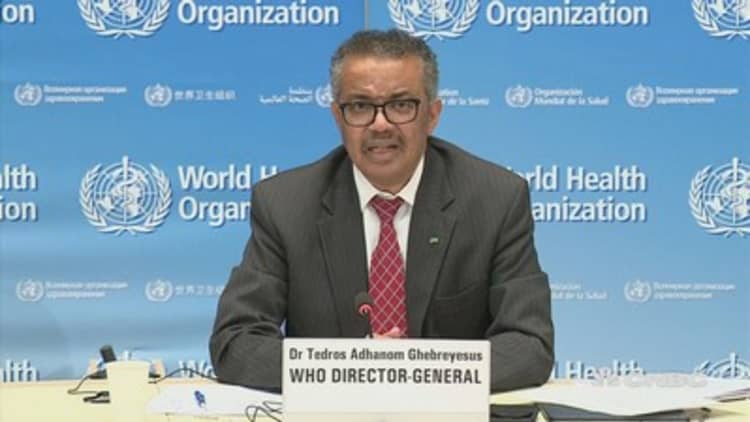Doctors and world leaders need "to be on the alert" for cases of a rare inflammatory disease in children that may be linked to the coronavirus, the World Health Organization said Friday.
World health officials are increasingly hearing about cases of an inflammatory disease similar to Kawasaki disease in a few countries, including the United States and Italy, Dr. Maria Van Kerkhove, head of WHO's emerging diseases and zoonosis unit, said during a news conference at the agency's headquarters in Geneva.
The WHO said initial reports hypothesized that this syndrome, which can cause high fever and swelling in blood vessels, may be related to Covid-19.

"We need more information collected in a systematic way because with the initial reports, we're getting a description of what this looks like, which is not always the same," Kerkhove said. "And in some children, they tested positive for Covid-19 and other children have not. So we do not know if this is associated with Covid-19."
Kerkhove said officials raised the alert among the WHO's global clinical network, which is a group of clinicians across the world dealing with Covid-19 patients.
Working with the network, the WHO has developed a preliminary case definition and a case report form for PMIS, according to WHO Director-General Tedros Adhanom Ghebreyesus.
"I call on all clinicians worldwide to work with your national authorities and WHO to be on the alert and better understand this syndrome in children," Tedros said.
Early in the outbreak, researchers and infectious disease experts said the virus appeared to be sparing children while hitting the elderly and those with underlying health conditions particularly hard.
Since then, researchers have learned much more about the virus, including that children do get it and can die from it, even without underlying conditions that tend to worsen symptoms. Most kids report mild respiratory symptoms, namely fever, dry cough and fatigue. However, some children can become seriously ill.
In New York, local health officials are investigating 110 cases of the disease they are calling pediatric multisystem inflammatory syndrome. So far, 16 other states across the U.S. and six European countries are also investigating the disease.
World Health Organization officials said last month that they were investigating whether the coronavirus causes Kawasaki disease in children after several cases cropped up in Europe.
As health officials struggle to find more information about the mysterious illness, Dr. Mike Ryan, executive director of the WHO's emergencies program, urged the need to understand the extent of the inflammatory syndrome's association with Covid-19.
"This is a new disease," Ryan said. "When new diseases cross the species' barrier, they very often don't have what you call a primary target organ."
There have been reports of respiratory syndromes, cardiovascular syndromes and neurological syndromes as a result of a Covid-19 infection because the virus can attack different types of organs, according to Ryan.
He said researchers don't know whether these syndromes, including PMIS, are directly associated with the coronavirus and their attack on human cells or if they're a result of the body's immune response to the virus.
"In many emerging diseases we see both happen," Ryan said. "The virus itself can cause damage and sometimes the immune response to the virus itself can cause damage."
There's still a lot to learn and uncover on "what's causing what," in order to develop countermeasures and therapies to reduce the impact of this disease in children, he added.


